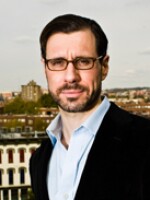MELISSA BLOCK, host:
Since Dmitry Medvedev was elected president of Russia, there's been speculation about his relationship with the former president, Vladimir Putin.
Putin moved on to what is traditionally a less powerful role, that of prime minister. Now, many observers say the events in Georgia should dispel any doubts of who's in charge in Russia.
Here's NPR's Gregory Feifer from Moscow.
GREGORY FEIFER: It was Vladimir Putin who, flying back from representing his country at the Olympics in Beijing, said Georgia had lost the rights to govern the pro-Moscow breakaway region South Ossetia, and it was Putin who denounced the West for supporting Georgia and criticizing what he called Russia's efforts to restore piece.
Prime Minister VLADIMIR PUTIN (Russia): (Russian spoken)
FEIFER: It's unfortunate that some of our partners aren't helping us but trying to hinder us, Putin said. It's not the cynicism that's astonishing. What's amazing is the ability to say black is white and white is black, he said, to portray the victims of aggression as aggressors. But many in the West see it differently.
For the first time since the collapse of the Soviet Union, resurgent oil-rich Russia attacks the territory of an independent country, killing civilians and destroying its military.
Georgetown Professor Celeste Wallander says Putin's public role in Russia's attack against Georgia is meant to show he is still in charge.
Professor CELESTE WALLANDER (Russian and East European Studies, Georgetown University): Any uncertainties that anyone might have entertained about who's in charge of Russian foreign policies truly must be dispelled.
FEIFER: From the start of Putin's presidency eight years ago, he said one of his main goals is restoring Russia's status in the world. Wallander says Putin's government has made a deliberate decision to violate international law now because it was unhappy about Georgia's pro-Western policies and drive to join NATO.
Prof. WALLANDER: The goal is to demonstrate to Georgia, to the United States, to Europe and to any other neighbors that Georgia, and possibly other countries on Russia's borders, has to take into account Russian preferences and Russian priorities and Russian red lines.
FEIFER: Ever since Putin launched his attack on America's status as the world's only super power in a speech in Munich last year, Moscow has been pushing proposals for a new global security structure.
Sarah Mendelson of the Center for Strategic and International Studies says the ferocity of Moscow's diplomatic and military attack may have been meant to undermine existing international security organizations such as NATO.
Ms. SARAH MENDELSON (Director, Human Rights and Security Initiative, Center for Strategic and International Studies): One could imagine possibly that they are using this very dramatic moment of, essentially, invading another country. You get everybody to the table.
FEIFER: President Dmitry Medvedev yesterday announced Russia was ending its military attack against Tbilisi. But today, Russian tanks were still in Georgia.
President DMITRY MEDVEDEV (Russia): (Russian spoken)
FEIFER: And throughout the crisis, it's been Putin who's dominated television meetings with generals. And it was Putin who was seen on Russian television visiting troops and comforting wounded soldiers near the Georgian border.
In the coming weeks and months, western countries will be seriously considering their relations with Russia. Some western politicians are suggesting Russia's exclusion from the group of eight leading industrial countries and other international institutions.
But few believe the West will risk much for tiny Georgia. And Georgian President Mikhail Saakashvili says the West is not doing enough.
President MIKHAIL SAAKASHVILI (Georgia): The consequences of this for the rest of the world, for world security, for human rights, for energy security, are absolutely tremendous and huge. Please wake up, everybody.
FEIFER: The United States and Europe are engaged in a major diplomatic effort to finally bring hostilities to an end and reach a lasting peace agreement. But many observers believe the conflict in Georgia won't end until Vladimir Putin decides to end it. And that it's Putin who will decide just how far Russia breaks with the West.
Gregory Feifer, NPR News, Moscow. Transcript provided by NPR, Copyright NPR.






